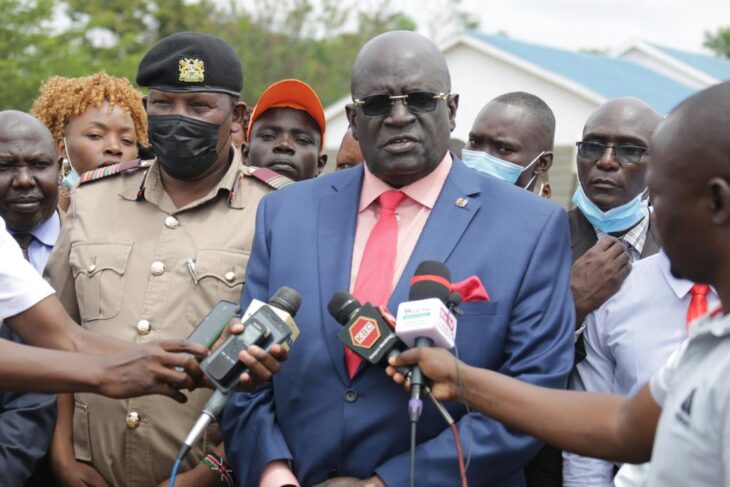NAIROBI, Kenya, Aug, 30 – Despite major disruptions to the academic calendar, Education Cabinet Secretary Prof George Magoha said that its all systems go for all national exams.
“All the national exams are ready,” he said while commissioning a competency-based curriculum (CBC) classroom at Nile Road Secondary school in Nairobi county.
After revealing that the government has extended the Junior Secondary School (JSS) selection period by 10 days, Magohahas now urged parents to select schools whose fees they can afford.
He specifically zoned out private schools saying that parents must comply with their terms and that if they can not then they can choose government schools since learning is free in day schools.
“There has been a little noise about capitation to private schools but that is not going to happen. The Constitution allows us to provide FDSE, so if you know you have no money to pay for feeding and boarding, choose any day school. Every child is protected there,” said Magoha.
Some parents have been put at fault for not following the selection guidelines despite clear rules set by the ministry.
The application portal was officially opened on August 15, 2022.
The move is reminiscent of the system used by candidates to select their preferred secondary school under the 8-4-4 before joining form one.
Already the education ministry alongside the Kenya National Examination Council (KNEC) released guidelines on the grading of the grade six assessments and placement to grade seven.
“I can almost certainly tell you that we will sit down with my team and decide whether to add some more time because this is so critical. It is the first time this is happening. If there is need for us to re-assess the Tuesday deadline, we shall come back to you,” said Magoha.
Learners have meanwhile also been urged to be patient and conscious when selecting the schools of their choice.
Each learner is expected to select two national, two regional, two county, four Sub-county, and two private junior schools.
Transition to JSS will be guided by the assessment outcomes of the Kenya Primary School Education Assessment (KPSEA).
Magoha said that all learners will be offered placement across the country’s public and private secondary schools.
In a bid to ensure public space for learning is well utilized, the CS also said that some secondary school will utilize available classrooms in primary schools to enhance learning.
Some secondary schools share a compound with primary schools.
At the same time, registered private schools will also admit learners.
During the selection of students for admission to grade 7, the education ministry is expected to observe several factors including, performance in the KPSEA, equity, institutional decade capacity, affirmative action from less privileged learners, and the learner’s choice of school.
Under the CBC, Junior Secondary School (JSS) will comprise Grades 7, 8, and 9.
“Learners, in consultation with their parents and teachers will be given an opportunity to select a public or private secondary school of their choice for their JSS education. Parents shall meet the cost of learning in private schools as is the usual practice,” said Prof Magoha.
Meanwhile, learners with special needs pursuing the Stage-Based Pathway will also be placed and will transition to JSS based on their performance in the Kenya Intermediate Level Education Assessment (KILEA).
During the grading of grade six assessments that will facilitate the transition to grade seven, KNEC in their guidelines revealed that they will factor in the results of both the formative and summative assessments.
The summative assessment will contribute to 40 per cent of learners’ score while the formative will contribute to 60 per cent drawn from assessments administered in grade four, five, and six. At every stage, they will amount 20 per cent, totaling 60 per cent.
KNEC will assess the 13 subjects offered at upper primary level using five papers.
They include Mathematics, English, Kiswahili/Kenyan Sign Language, Integrated Science which comprises of Science and Technology; Agriculture; Home Science; and, Physical and Health Education, and Creative Arts and Social Studies which combines four subjects among them Social Studies; Christian Religious Education/Islamic Religious Education/Hindu Religious Education; Art and Craft and Music.
The overall score will be reported as a summation of the scores in the five papers and will be out of 500 marks.
The credibility of School-Based-Assessments (SBAs) is expected to be upheld with relevant measures put in place.
“KNEC is administering the final Grade six SBA to the 2022 cohort between July 18 and September 9,” he said.
Grade Six learners will sit their final assessment from November 28 to November 30, 2022.
Meanwhile, as opposed to the examination certificate issued by the Exam council after candidates completed their Kenya Certificate of Primary Education (KCPE) Examination under the 8-4-4 curriculum, they will now be issued with a transition report for the KPSEA.
A total of 2,512,467 learners are expected to join secondary school education in accordance with the government policy on 100 per cent transition from primary to secondary schools.
They include, 1,268,830 learners enrolled in Grade 6 in 2022 who will transition to grade 7 under the CBC and 1,243,637 Standard 8 cohort of 2022 who will transition to Form One under the 8-4-4 system.
Want to send us a story? Contact Shahidi News Tel: +254115512797 (Mobile & WhatsApp)


